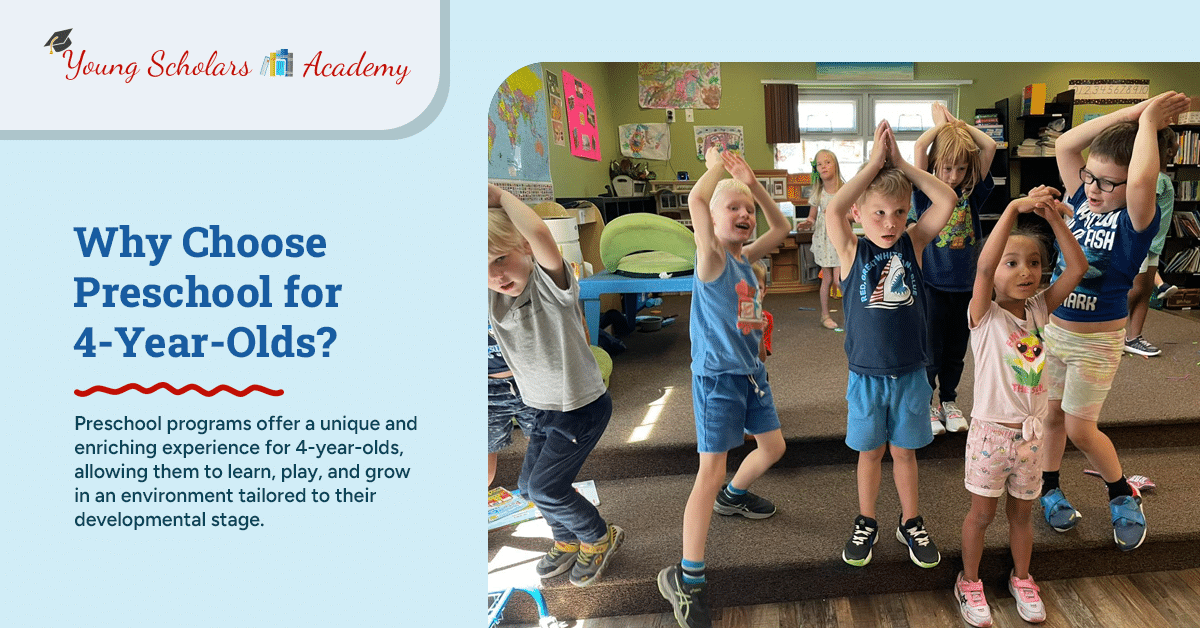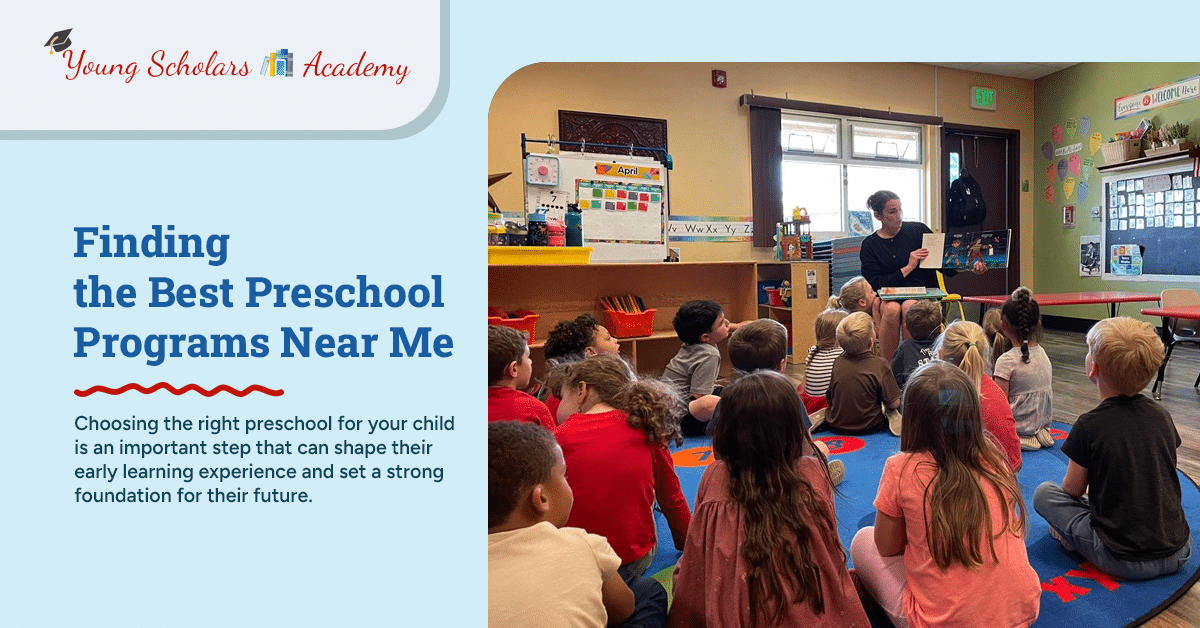Preschool programs offer a crucial foundation for young learners, helping them grow academically, socially, and emotionally in a nurturing environment. At Young Scholars Academy, our programs support each child’s unique growth, fostering curiosity, confidence, and lifelong learning.
With hands-on activities and a warm, inclusive atmosphere, children here thrive, make new friends, and experience the joy of discovery daily. Read on to learn more about the benefits of preschool programs and why they’re so valuable for your child’s early development.
The Importance of Early Education Programs
Early education programs lay the essential groundwork for a child’s development, nurturing skills supporting academic and personal growth. These programs foster a love of learning from the start, encouraging children to explore, question, and grow in a supportive environment. Here’s why early education is crucial to a child’s journey.
Building a Strong Cognitive Foundation
Early education programs introduce young learners to foundational skills through play-based, hands-on activities. These experiences strengthen critical thinking, memory, and problem-solving abilities, preparing children for more structured academic settings in the future. The activities not only engage young minds but also encourage children to explore new ideas and concepts in a way that feels natural.
Some key activities that support cognitive development include:
- Storytime and reading sessions: These help children build vocabulary and understanding, expanding their language skills.
- Puzzles and building blocks: Working with puzzles and blocks promotes logical thinking, spatial awareness, and patience.
- Creative arts: Activities like painting and crafting foster imagination while strengthening fine motor skills.
These early experiences allow children to build essential cognitive skills at their own pace, setting a solid foundation for lifelong learning.
Encouraging Social and Emotional Development
Children can develop social and emotional skills in early education settings that are fundamental to healthy relationships and effective communication. Group activities teach children how to listen, share, and work cooperatively. Early exposure to a social environment also helps children refine emotional resilience as they learn to express and manage their feelings.
Social and emotional growth is encouraged through activities like:
- Circle time discussions: This time helps children practice listening, taking turns, and engaging in respectful dialogue.
- Collaborative games: Working together in groups fosters cooperation, patience, and understanding of teamwork.
- Conflict resolution exercises: Simple exercises teach children how to express feelings constructively and find peaceful solutions.
These experiences build emotional intelligence, helping children develop empathy and self-awareness that will benefit them.
Nurturing a Lifelong Love for Learning
One of the greatest outcomes of early education is fostering a lifelong enthusiasm for learning. Early education programs inspire curiosity and joy in discovery by creating a positive, stimulating environment. Children who view learning as an exciting adventure are likelier to carry that enthusiasm into future academic pursuits.
This love for learning is cultivated through the following:
- Interactive activities: Hands-on experiences make learning tangible, connecting concepts to real-world applications.
- Creative expression: Art, music, and storytelling encourage curiosity and imagination, broadening a child’s perspective.
- Positive reinforcement: Recognizing a child’s efforts and curiosity helps build confidence, fueling their interest in learning.
Through these experiences, children develop an intrinsic motivation to learn, a powerful tool in academic settings and personal growth. Early education thus plays a vital role in setting children toward a fulfilling and prosperous future.
Why Choose Preschool for 4-Year-Olds?
Preschool programs offer a unique and enriching experience for 4-year-olds, allowing them to learn, play, and grow in an environment tailored to their developmental stage. At this age, children are eager to explore, make friends, and understand the world around them. Preschool prepares them for kindergarten and fosters essential social, emotional, and academic strengths that lay the groundwork for lifelong learning.
Developmental Milestones at Age 4
By age 4, children are reaching critical developmental milestones, both cognitively and socially. Preschool helps support these milestones through age-appropriate activities and interactions. Programs are designed to nurture their growing independence, curiosity, and ability to understand more complex concepts.
Some critical developmental skills fostered in preschool include:
- Language and Communication: Through storytelling, songs, and group discussions, children enhance vocabulary and listening
- skills.
- Fine Motor Skills: Drawing, cutting, and painting strengthen hand-eye coordination and dexterity.
- Self-Control: Structured play and group activities teach patience, sharing, and the ability to follow instructions.
These skills are essential as children navigate social and academic settings, providing a solid foundation for success in kindergarten and beyond.
Social Interaction and Friendships
At age 4, children are eager to connect with their peers, making preschool an ideal setting for social development. In a preschool environment, children have daily opportunities to play, collaborate, and form friendships, which are essential for emotional growth. Interacting with other children helps them learn valuable social skills, such as empathy, collaboration, and problem resolution.
Preschool supports social interaction through activities like:
- Group Play and Collaborative Games: These activities teach children to work as a team, share ideas, and listen to others’ perspectives.
- Circle Time and Storytelling: Group discussions allow children to practice speaking, listening, and respecting others.
- Dramatic Play Areas: Pretend play fosters creativity and teaches social roles, helping children develop a deeper understanding of the world.
Through these interactions, children gain confidence in their social abilities, which prepares them for future group settings and strengthens their sense of belonging.
Academic Readiness for Kindergarten
Preschool for 4-year-olds is designed to introduce foundational academic skills that prepare children for the structured learning environment of kindergarten. These programs incorporate early math, literacy, and problem-solving activities, making learning engaging and accessible. Preschool encourages curiosity and supports each child’s pace, creating a positive attitude toward education.
In a preschool program, children typically engage in:
- Early Literacy Activities: Recognizing letters, sounds, and essential words builds reading readiness.
- Math and Counting Games: Activities like sorting, matching, and counting help children understand numbers and patterns.
- Science and Exploration: Simple experiments and nature activities inspire curiosity about the world.
These experiences enhance cognitive development and create excitement about learning, vital as they move on to more formal education. By building these foundational skills, preschool helps set children on a successful path, fostering a love for learning and confidence that will serve them for years.
Finding the Best Preschool Programs Near Me
Choosing the right preschool for your child is an important step that can shape their early learning experience and set a strong foundation for their future. The best preschool programs create an environment where children feel safe, encouraged, and engaged in learning. If you’re searching for the best preschool programs near me, here are key factors to ensure you choose the right fit for your child’s needs and personality.
Prioritizing Program Quality and Accreditation
Quality and accreditation are essential when selecting a preschool, as they indicate that the program meets high educational and safety standards. Accredited preschools have undergone rigorous evaluations to ensure they provide a structured, supportive, and developmentally appropriate environment for young children.
Some quality indicators to look for include:
- Accreditation Status: Look for preschools accredited by reputable organizations, such as the National Association for the Education of Young Children (NAEYC), which evaluates programs for their adherence to best practices.
- Qualified Staff: Check if teachers are certified in early childhood education and have experience working with young children.
- Low Student-to-Teacher Ratios: Smaller class sizes ensure more individualized attention and support for your child.
Choosing an accredited preschool can give you peace of mind, as you know that your child is in a safe, high-quality educational setting.
Exploring Curriculum and Teaching Approach
Preschool programs vary in teaching methods, from traditional classroom setups to play-based or Montessori-inspired approaches. It is important to understand the preschool’s curriculum and how it aligns with your child’s learning style. A curriculum that encourages exploration, hands-on learning, and creativity is often best for young learners.
Common elements of high-quality preschool curricula include:
- Play-Based Learning: Many preschools incorporate play as a primary learning mode, helping children explore and discover independently.
- Structured and Free Play Balance: Look for programs that balance structured activities, like circle time, with opportunities for free play.
- Social-Emotional Learning: Programs emphasizing emotional intelligence and social skills can help children develop empathy and self-regulation.
By understanding the curriculum and teaching philosophy, you can select a preschool that nurtures your child’s strengths and supports areas for growth.
Visiting and Observing the Preschool Environment
One of the most essential steps in finding the best preschool program near you is to visit the school and observe the environment. This lets you get a feel for the daily activities, classroom setup, and overall atmosphere. Many preschools encourage prospective parents to tour their facilities and observe a class.
During your visit, pay attention to:
- Classroom Setup and Materials: Check for age-appropriate materials and spaces that encourage learning and exploration.
- Teacher and Student Interactions: Observe how teachers engage with students, promote respect, and handle conflicts.
- Safety and Cleanliness: Ensure the preschool follows hygiene and safety protocols, such as childproofing and regular cleaning.
Seeing the environment firsthand can help you gauge whether it’s a space where your child will feel comfortable, inspired, and cared for.
Considering Practical Factors and Parent Involvement
Beyond educational philosophy, it’s important to consider practical details such as location, hours, and cost. A preschool’s location and schedule should align with your family’s daily routine. Additionally, find out how the school involves parents in the learning process. Programs that foster parent-teacher communication and involve families in school activities often create a stronger sense of community and support for your child.
Practical aspects to consider include:
- Location and Hours: Choose a preschool that fits your commuting needs and offers hours that align with your schedule.
- Tuition and Fees: Understand the financial commitment, including additional fees for activities or supplies.
- Parent Involvement Opportunities: Look for programs encouraging parents to participate in events, workshops, or volunteer opportunities.
Considering these practical factors, you can find a preschool program that supports your child’s development and fits seamlessly into your family’s lifestyle. Evaluating these aspects can lead you to the ideal preschool program near you, setting the stage for a positive, enriching educational journey.
Conclusion
Choosing the right preschool program is among the most impactful decisions for your child’s early development. High-quality preschools do more than teach foundational skills; they inspire curiosity, build confidence, and cultivate lifelong learning habits in a safe, nurturing environment. Whether it’s finding a program that aligns with your child’s unique needs, ensuring social and emotional growth, or preparing them academically for kindergarten, a well-chosen preschool can set the stage for a bright future filled with possibilities.
Ready to explore the benefits of a preschool program that prioritizes your child’s growth and happiness? Contact Young Scholars Academy at (719) 522-9099 or visit our contact page to learn more about our enriching, supportive programs. Let’s start this exciting journey together!


Leave a Reply